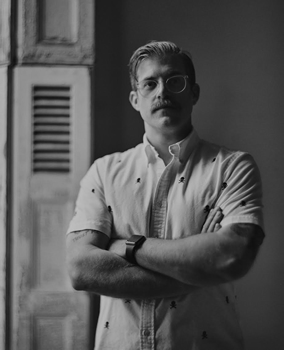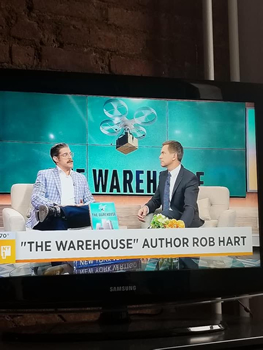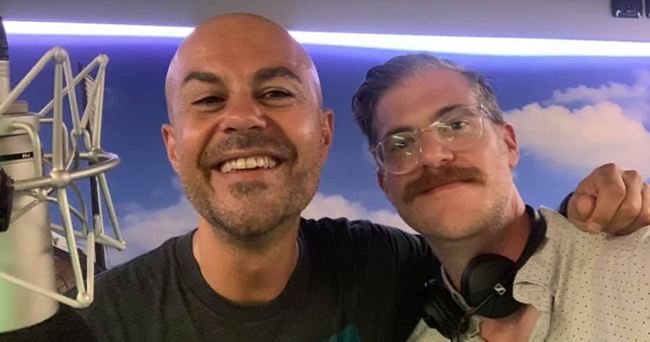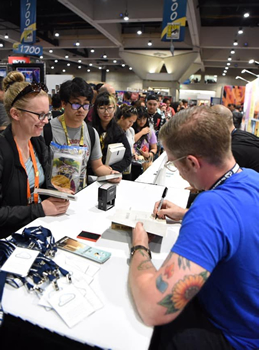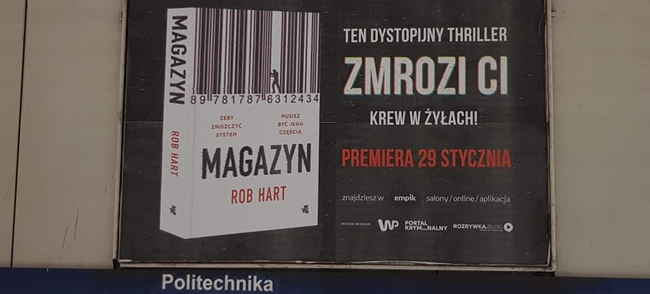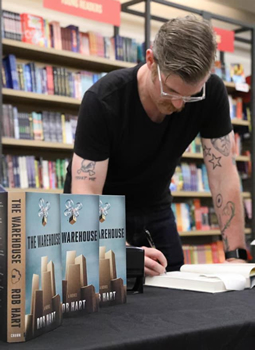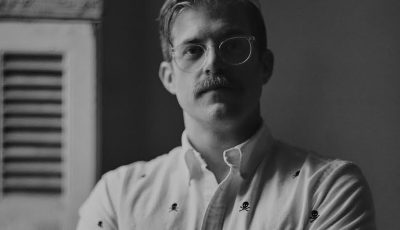

Between the Lines: Rob Hart
Time Travel, Robots, and Dinosaurs—Oh My!
 By Dawn Ius
By Dawn Ius
Rob Hart would never call himself an overnight success—he’d written a half dozen (excellent) novels, including one with bestselling author James Patterson, before the internet blew up with heartfelt congratulations for Hart’s very good new book deal. In 2018, The Warehouse was picked up in a pre-empt prior to an auction that saw the novel sold in 20 different languages, and included an option deal from none other than award-winning filmmaker Ron Howard.
After the novel released in 2019, Hart found himself in the perhaps unenviable position of trying to come up with a worthy second book—for the second time.
“It’s funny: they talk about how your second book is so much harder than the first, and my second book, City of Rose, didn’t give me any trouble at all,” he says. “This one, though… I actually tried to write a whole other book, and it just wasn’t coming together. I think the problem was I was writing what I thought people would expect of me, rather than the book I wanted to write.”
That book is THE PARADOX HOTEL, a genre-bending time-travel locked-room-style murder mystery featuring a rotting corpse, robots, and dinosaurs. And that’s just scraping the surface of a novel so twisty and unbelievable it shouldn’t work—and yet, in Hart’s deft hand, it does. Brilliantly.
But as Hart is quick to point out, the novel didn’t come easily, or without tremendous internal and external pressures.
“As for how I combatted those pressures, I got into therapy,” he says. “That helped. I have a supportive team and great friends. I just kept showing up and figuring eventually someone would tell me to go home. And no one has told me to go home yet.”
It’s unlikely anyone will.
Publishers Weekly says Hart “remains a writer to watch,” and THE PARADOX HOTEL is littered with generous and well-deserved praise from a star-studded list of genre powerhouses. In this interview with The Big Thrill, Hart talks about weathering the pandemic, the importance of following his creative muse, and how he slid “dinosaurs” by his agent with barely a raised eyebrow.
THE PARADOX HOTEL is a markedly different book than The Warehouse—it’s sci-fi, noir…it has time travel! An intentional decision to step outside the genre boundaries a little, or more a case of “following where the story takes you”?
Years ago, I was at Sleep No More, an interactive theater experience in New York City, and I got this idea for a time travel hotel. And that was pretty much it. It was a Google doc that said “time travel hotel,” and it sat on the back burner and just kept developing until it started to come to a boil. But I knew I wanted to write a time travel story. There were some themes of how quantum mechanics and Buddhism dovetail from each other that I wanted to explore. I don’t know that I was intentionally going back to that sort of crime/investigator arena, but once I did, it certainly felt nice to slip into that voice again after doing The Warehouse. I think I needed to focus back on something a little more intimate: one character, first-person perspective. But also with robots and dinosaurs.
Regardless of how sci-fi the plot, you made it relevant, given that space travel has become quite a marketable commodity in the last couple of years. Does the prospect of space travel in a private ship frighten or excite you? How much, if at all, is THE PARADOX HOTEL a commentary of your feelings about recent space travel development?
The space travel thing was a really useful device. As I was approaching this I realized: if we invented time travel, it would probably be hugely expensive. Think of all the energy and technology it would require. So of course, the only people traveling through time would be the government and the super-rich. Once I make that connection with space travel, it really clicked. I’d say the book is less about space travel, and about how billionaires will let the world burn as long as it means adding a single cent to their stock portfolio. I’m not sure if I’d ever want to travel into space—at least not with guys like Bezos or Musk. The whole Silicon Valley attitude of “move fast and break stuff” doesn’t really track with keeping people alive. I would trust NASA. I much prefer their attitude of “check everything 27 times before anyone does anything.” Which, considering Musk is about to accidentally crash one of his rockets into the moon, is bearing out…
Because of the brilliant nature of the plot, you were able to throw a lot at us—even dinosaurs! I’m a little envious—writing about dinosaurs has been a dream since the first time I read Jurassic Park. What kind of research was required for this book—historical, technical, etc.? Was there anything that surprised you as you were researching?
My favorite comment from my agent was, after Publishers Weekly gave it a starred review, he texted me and said: “You come to me with a book with DINOSAURS in it.” I know it was a bit of a swing, and I love them so much. When it came to the science stuff—I read a lot about time travel theory and quantum physics (and watched Timecop again). Though there’s a point where you have to just accept that you’re going to make it all up and try your best. And I dug into hotels and space travel and deeper into Buddhism, and a few other things. But honestly, the biggest surprise was about the dinosaurs. I knew I wanted raptors, but apparently velociraptors only grow to the size of large turkeys. The raptors we think of from Jurassic Park are actually utahraptors. Which does not sound nearly as cool.
You’ve asked a lot from this book—it’s packed with whip-smart action, mounting suspense, memorable characters, not to mention (again) dinosaurs. It’s funny, spooky—and heartbreaking. Aside from a good read, what do you hope readers take away from this book with respect to the themes of grief and loss?
There are certainly some real-world issues I wanted to unpack: billionaires are evil, we need to stop privatizing stuff, classism is bad. But this one felt pretty personal to me too, and the thing that resonated with me and I hope resonates with readers is: The hardest thing you have to do is face yourself.
Despite the twists you’ve woven in, THE PARADOX HOTEL is a locked-room mystery at its core. What are some locked-room mysteries that you have read and loved, and how did they influence your writing of this novel?
I wouldn’t call myself an expert on locked-room mysteries, and I’m sure there’s plenty I’ve read that would fit the category, but I’m not even savvy enough to say which. I will say that I loved Murder on the Orient Express by Agatha Christie. I saw They All Fall Down by Rachel Howzell Hall called a locked-room mystery, given the island setting, and I would say: Sure! Rachel is brilliant, and I’ll read anything she writes. There’s something about setting a book like this in a single setting that is just so much fun. I wish I could name more concrete examples—I feel like someone is going to demand my Thriller Writer card back. But it’s really rewarding to put a reader at the starting line with something that makes no sense and then slowly reveal how it does…
It’s not a spoiler to say that the mystery/crime element comes in the form of timeline manipulation, which to me feels like an ambitious undertaking as a writer—there are so many logistics to work through. How did you go about unravelling all of the potential “consequences” as you wrote?
I’m a lunatic outliner. Besides needing a really intense outline to sort all this stuff out, I visited the TWA Hotel at JFK, which I used for visual inspiration, and then I sat down with a big piece of poster board and drew a schematic of what I wanted the Paradox to look like—with all the rooms marked off and everything. Having a map and reams of research helped me make sense of all the time travel shenanigans—to a point. I thought I did a pretty good job and handed it to my editor, who just immediately clocked every inconsistency. He’s a storytelling technician, so while I was pretty happy with the mechanics I developed, he really helped me get them to where they needed to be.
Tell me about January Cole, the unreliable narrator of the book and house detective of this fictional hotel. What, or who, was the inspiration for her character?
This is such a woo-woo answer, but as I was assembling the book, I had all this research and all these disparate ideas for how it might come together, and then one day just had this image of a woman wearing a Boho hat stepping off an elevator. She was very angry but also carrying a lot of emotional weight, to the point where it was radiating off her, and I thought, “Oh, there she is. Her name is January. I understand this book now.” That’s usually how it goes for me, though; with The Warehouse, I was reading Sam Walton’s autobiography, got this very clear image of Gibson Wells, the CEO of Cloud, and was like, “Oh, there he is. I understand this book now.” I’m learning that this is my process: I tend to read and research and stew on it until one day something just clicks. Usually, it’s about finding the character I need, and I’m finding that sometimes the character finds me.
The pandemic has slowed a lot down, including Hollywood. But many of us are waiting to hear news on the film adaptation of The Warehouse. Anything you can share? Also, THE PARADOX HOTEL feels primed for major motion picture—any movement there you can talk about?
There’s nothing concrete I can share at the moment on The Warehouse, but I’ve heard some encouraging things and am just waiting to see how those things take shape. THE PARADOX HOTEL was optioned for TV by Working Title, and they brought on Jacob Chase, who wrote and directed the very excellent movie Come Play, to write the pilot. I just read it, and he did an incredible job—it actually makes me a little jealous, with how he spun out some of the worldbuilding. I’m happy to say that Ash McKenna got optioned too, and there’s a great team putting together a pilot for that. So right now, it’s a lot of waiting to see what happens next. Which ain’t such a bad place to be.
Speaking of the pandemic, though of course we’d rather not, how have you had to adapt in terms of your productivity? I know socializing with your peers is important to you—how have you filled that gap during these times of isolation? Any tips on refilling the creative well?
I’ve got a small group of writer friends that I spend a lot of time with, and now that we’re all vaccinated and boosted, it’s nice to have that. Otherwise, I try my best to stay connected with people the best I can, over the internet, or sometimes the occasional Zoom or phone call, just so things don’t feel so damn lonely. As for how to refill the creative well: It’s tough. The most effective way for me to do it was conferences and bookstores and comic-cons… and those are pretty much off the table right now. I’ve been doing my best to stay busy, but also, read more, watch more movies… just surround myself with good stories. That helps to keep the creative juices flowing.
What can you share about what you’re working on next?
I can’t share anything! I’m co-writing a comic book with Alex Segura (whose incredible novel Secret Identity is available soon!). I hope we get to announce that soon—it’s pretty much done. I’ve got another comic in the pitch stage that I’d write myself (fingers crossed), and Alex and I have something else cooking up that we’re co-writing, but that’s only just going on submission. Otherwise, I’ve got a couple of projects I’m toying with as I try and figure out my next novel—I mostly have it nailed down, but it just hasn’t taken the right shape yet. Don’t have the character yet. I’m getting out of the way and just allowing it to percolate. Whoever is going to carry this thing knows where to find me.
- The Ballad of the Great Value Boys by Ken Harris - February 15, 2025
- Don’t Look Down by Matthew Becker - February 15, 2025
- The Wolf Tree by Laura McCluskey - February 14, 2025

